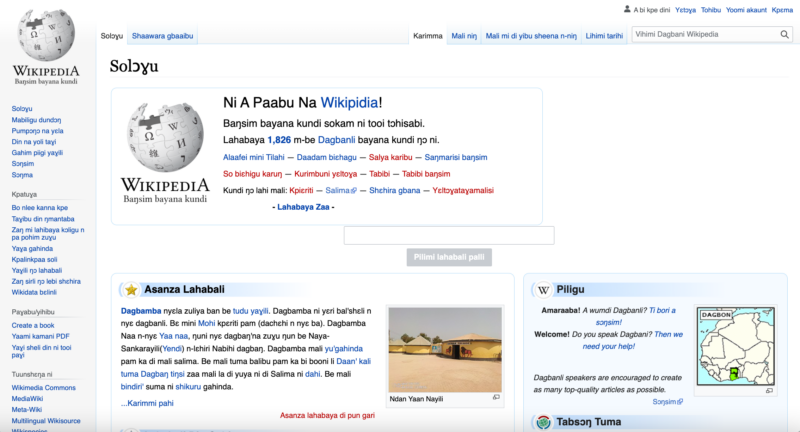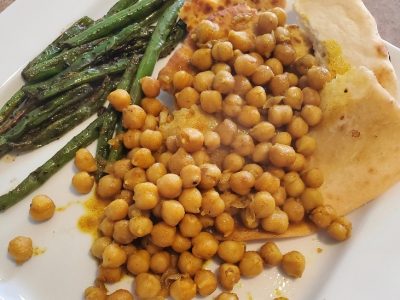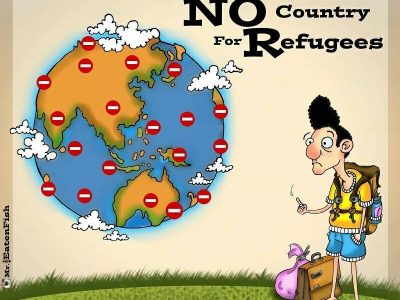
صورة مُتاحة من طرف “الحسن محمد أوال”، استُعملت بعد الموافقة
كجزء من سلسلتنا اليومية في إلقاء الضّوء على عمل النّاشطين الذّين يُروّجون للّغات الإفريقية في الفضاءات الرّقمية، نقدّم لكم “الحسن محمد أوال” (@Alhassa51457950) من غانا.
تمحور معظم عمل “الحسن” في كونه مؤسس شريك لفريق المستعملين لوكيميديا بلغة الدغباني، من أجل مساعدة إنشاء معارف حرة في لغته الأمّ.
حاورت رايزين فويسز مؤخرًا “محمد أوال” عبر البريد الالكتروني لمعرفة وجهة نظره بخصوص المساحة التّي تشغلها لغته في الفضاءات على الإنترنت.
رايزين فويسز (ر.ف): من فضلك، حدّثنا عنك.
Alhassan Mohammed Awal (AMA): I am Alhassan Mohammed Awal. Co-founder of the Dagbani Wikimedians User Group.
I am the Communications, Outreach and Campaigns Director for the User Group. I am also an activist for child-rights and girl-child education. My interest in digital activism includes promoting the use of various Wikimedia tools such as Wikipedia, Wikidata, Wikimedia commons, Wiktionary and any other Digital language support tools available to facilitate my language activism work on the internet.
I want the Dagbani language to go global and fill up every available digital space. I envision having the language recognized by all search engines on the internet. Outside of the Wikimedia community, I am an educationist working in the Ghana Education Service (GES). I worked as a classroom teacher, Headteacher, appointed an examination Officer for Nanton District Education Directorate in the northern region of Ghana and was later reassigned to become a Basic Education Coordinator and I am currently a School Improvement Support Officer (SISO). In addition, I am passionate about writing and volunteerism.
الحسن محمد أوال (ال.م.أ): أنا “الحسن محمد أوال”، مؤسس شريك فريق مستخدمي ويكيميديا بلغة الدغباني.
أنا مدير الاتصالات والنّشر ومؤسسات فريق المستعملين؛ أنا أيضًا ناشط في حقوق القُصر وتربية البنات. يضمّ اهتمامي، في النّشاط الرّقمي، ترقية استعمال وسائل مختلفة لويكيميديا مثل ويكيبيديا، ويكيداتا، ويكيميديا كومونز، ويكسيوناري وأيّة وسيلة أخرى ذات دعم لساني رقمي مُتاح لتسهيل عملي في نشاطي اللّساني على الإنترنت.
أرغب في أن تكون لغة الدغباني مُعمّمة وشاملة في كلّ الفضاءات الرّقمية المُتاحة؛ حيث يتم التعرّف عليها من جميع محركات البحث على الإنترنت. خارج مجتمع ويكيميديا، فأنا مُربي وأعمل في “مصلحة التّربية بغانا” (GES)؛ وأعمل كمعلّم ومدير مدرسة، عُينتُ كموظف اختبارات من طرف مديرية التربية لمقاطعة “نانتون” (Nanton)، في المنطقة الشّمالية لغانا، كُلّفتُ بعدها لشغل منصب منسّق التّربية الابتدائية وحاليًا أشغل منصب مُوظف مُكلّف بدعم التّحسين الدّراسي (SISO)؛ كما أنّني شغوف بالكتابة والأعمال التّطوعية.

لقطة شاشة لصفحة ويكيبيديا بلغة دغيباني
(ر.ف): ما هي حالة لغتك سواءً على الإنترنت أو خارجه؟
AMA: Dagbani is one the under-represented languages online. Unlike other languages with which one can access information by searching for instance on Google, the reverse is true for Dagbani.
There is not even a Dagbani local magazine where at least, students can read about issues happening around them in the Dagbani language talkless any national print Media. No significant air space has been allotted for the Dagbani language in most TV and radio stations in Ghana.
When it comes to offline, there are some Dagbani materials/books in some schools and in few public libraries but they are not easily accessible or free-to-use. It is only in one university where the Dagbani language is studied as a course, even though only few students are interested in studying the language. Many Dagbani natives are interested in studying the English language and other courses at the universities at the expense of their own language.
(ال.م.أ): الدغباني هي إحدى اللّغات الأقلّ تمثيلاً على الإنترنت؛ على خلاف اللّغات الأخرى التّي يمكنها الوصول إلى المعلومة، عند البحث على جوجل، فإنّه فيما يخص لغة الدغباني يحدث عكس ذلك.
لا توجد حتّى مجلة محلية بالدغباني تُتيح على الأقل للطّلبة قراءة بلغتهم ما يحدث حولهم دون الحديث عن أي وسيلة إعلامية وطنية منشورة. إنّ معظم برامج الإذاعة والتلفزيون في غانا لا تُخصّص فضاءً مُهمًا بلغة الدغباني.
فيما يخصّ الوسائل الإعلامية خارج الإنترنت، يوجد بعض الوسائل والكتب بلغة الدغباني في بعض المدارس والمكتبات العمومية، ولكنّه لا يمكن الوصول إليها بسهولة وليست مجانية. تُدرس لغة الدغباني فقط في الجامعة كمادة، ولو أنّه هناك قلة من الطلبة من يهتموا بدراسة اللّغة الإنجليزية ومواد أخرى في الجامعات على حساب لغتهم الأمّ.
(ر.ف): ما هي مُحفّزاتك لتكون لُغتك حاضرة في الفضاءات الرّقمية؟
AMA: Dagbani is one of the 16 Mole-Dagbani ethnic groups of languages (which are interrelated and trace their roots to a common ancestor) spoken in the northern region of Ghana. The speakers of this language alone (out of the 16 interrelated languages) are estimated to be over 3 million people. This is one of the biggest languages spoken in Ghana. As a self motivated language activist, I want the Dagbani language to go global and fill up every available digital space. I envision having the Dagbani language recognized by all search engines on the internet.
I hope to have Dagbani speakers begin reading and writing contents in Dagbani on the digital spaces with ease and to get all contents in Dagbani made available, accessible, and free to use on the digital platforms. I also hope to achieve the same for all the 16 Mole-Dagbani sub ethnic groups.
(ال.م.أ): الدغباني هي من بين المجموعات الإثنية الست عشرة للغات “مول دغباني” (وهي لغات مُترابطة فيما بينها وتنتمي جميعها لنفس الّلغة القديمة) التّي يتحدث بها في المنطقة الشّمالية لغانا. قُدّر عدد المُتحدثين بهذه اللّغة (من بين اللغات 16 المُرتبطة فيما بينها) أكثر من ثلاثة ملايين؛ إنّها من بين اللّغات التّي يتحدث فيها بكثرة في غانا. أرغب بمثابتي ناشط لغوي أن تكون لغة الدغباني مُعمّمة وشاملة في الفضاءات الرّقمية المُتاحة؛ واعتزم أن تُعترف الدغباني في محركات البحث على الإنترنت.
أتمنى أن يشرع المتحدثون في قراءة وكتابات المُحتويات بلغة دغباني في الفضاءات الرّقمية بسهولة وأن تكون المُحتويات بلغة الدغباني مُتاحة، ويمُكن الوصول إليها ومجانية على المنصات الرّقمية؛ أتمنى أيضًا متابعة نفس المسار بالنسبة للّغات 16 من مجموعة اللّغات الإثنية “مول دغباني”.
(ر.ف): صفّ بعض الصُّعوبات التّي تمنع لغتك من الاستعمال الكامل على الإنترنت.
AMA: One challenge is the over glorification of the English language. The stigma associated with Dagbani language teachers is that only those who are not good in the English language are the ones studying/teaching the Dagbani language. Hence, for one to be Karimba (Dagbani teacher) even your students do not take you seriously because they do not wish to become like you. How then do they “waste their time” creating Dagbani content online?
Those who cross the hurdles to study the language at the University often end up not being employed by the Ghana Education Service to teach, especially in the basic schools where children can be caught young to develop interest in creating content online in their mother tongue.
Also, the language is not being supported by many technological tools like iOS keyboards with Latin characters to type in Dagbani.
Another is a lack of skills to create online contents
(ال.م.أ): من بين التّحديات نجد التّبجيل المُفرط للّغة الإنجليزية؛ فأساتذة لغة الدغباني يوصمون كأشخاص لا يتقنون الإنجليزية وبالتّالي يدرسون/ويعلمون الدّغباني؛ وبالتّالي لتُصبح “كريمبا” (أستاذ في لغة الدغباني)، لا يأخذك حتّى تلاميذك على محمل الجدّ، لأنّهم لا يرغبون أن يكونوا مثلك؛ فما بالك إذن أن “يُضيعوا وقتهم” في إنشاء مُحتويات بلغة الدغباني على الإنترنت؟
أولئك الذّين يجدون صعوبة في دراسة اللّغة في الجامعة لا تُكلفهم، في غالب الأحوال، مصلحة التّربية في غانا بالتّعليم، لاسيما في المدارس الابتدائية، حيث يُمكن أن يكون للأطفال أن يهتموا مُبكرًا لتطوير اهتمامهم في إنشاء مُحتويات على الإنترنت بلغة الدغباني.
إضافة إلى ذلك، فإنّ اللّغة ليست مُدّعمة بوسائل تكنولوجية عديدة مثل لوائح مفاتيح لنظام iOS بالأبجدية اللاّتينية للكتابة بالدغباني.
شيء آخر وهو نقص المُؤهلات لإنشاء مُحتويات على الإنترنت.
(ر.ف): ما هي الاجراءات الملموسة التّي يُمكن اتخاذها لتحفيز شّباب كثيرين للشروع في تعلّم لغتهم أو مُواصلة استعمالها؟
AMA: It is necessary for Digital Language Activists like myself to create platforms and roll out creative programs to equip young people with the necessary skills to create content in their mother tongues.
Initiatives such as the ones our team have been doing, that is creating over 500+ Dagbani lexemes on Wikidata, rolling out Dagbani Wikipedia Saha, a TV broadcast program initiated to teach people especially the young ones in all corners of the country on how to edit on Dagbani Wikipedia, translation of online materials into Dagbani, audio recording of over 4,000 Dagbani words and uploading same on Wikimedia Commons, and many more are all fun and attractive ways of engaging the young people to creating contents in their languages.
Governments should support in recruiting and resourcing people who study Dagbani language into our schools to provide proper guidance to school children to develop interest in using their own language.
(ال.م.أ): من الضّروري أن يُنشأ النّاشطون اللغويون الرّقميون، مثلي، منصات وأن يضعوا تحت التّصرف برامج إبداعية لتزويد الشّباب بالمُؤهلات الضّرورية لإنشاء مُحتويات بلغتهم الأمّ.
مُبادرات كالتّي قام بها فريقنا، أي إنشاء أكثر من 500 كلمة بالدغباني في “ويكيداتا”، وإطلاق “دغباني ويكيبيديا ساحا“، وهو برنامج تلفزيوني شرع فيه لتعليم النّاس، وعلى وجه الخصوص، الشّباب من كلّ أرجاء البلد، ونشر “ويكيبيديا” بالدغباني، وترجمة المواد على الإنترنت بالدغباني، والتّسجيل الصّوتي لأكثر من 4000 كلمة بالدغباني ونشرها على “ويكيميديا كومونز” وأكثر بذاك؛ إنّها وسائل مُمتعة وجذابة من شأنها أن تقوم بإشراك الشّباب في إنشاء مُحتويات بلغاتهم.
يجب أن تدعم الحكومات تشغيل وتمويل الأشخاص الذّين يدرسون الدغباني في مدارسنا بغية إمداد التّلاميذ بالاستشارات المُناسبة وتعزيز الاهتمام لاستعمال لغتهم الأمّ.







